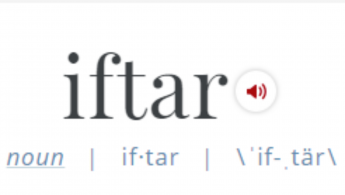A movable feast: Merriam-Webster adds 'iftar' to its dictionaries
Iftar, a meal Muslims enjoy to break their Ramadan fast, has been added to the US dictionary Merriam-Webster.
2 min read
'Iftar' has entered the Merriam-Webster English language dictionary [Merriam-Webster]
US publisher Merriam-Webster have added the word "iftar" to its dictionaries, as Arabic makes another official entry into the English language.
Iftar is the meal Muslims partake in when breaking their fast during the holy month of Ramadan, when worshippers forgo food, water and smoking from dawn until sunset.
The word is described as "a meal taken by Muslims at sundown to break the daily fast during Ramadan".
Although other Arabic words have officially entered the English vernacular in recent decades - including "hijab", officially in 1980 - others have become an integral part of the language for centuries.
"Algebra", "alcohol", "magazine" and "lemon" all have their roots in the Arabic language.
Islamic terms such as "Ramadan", "jihad", and "sharia" have also been used for centuries by Arabists and scholars of Islam in the English-speaking world.
There have also been calls for Anglicised Arabic words - such as "hijabi" and "hijabista" - popular with young Muslims, to be formally added to English dictionaries.
But the entry of "iftar" to the Merriam-Webster dictionary - one of the world's oldest and most widely used glossaries of English - is a small victory for the Arabic-speaking world.
Also added to dictionaries this year is "hangry" ("irritable or angry because of hunger"), "hophead" ("a drug addict" or "beer enthusiast") and "airplane mode".
Over the past two years, Merriam-Webster's definition of the word "collusion" has been regularly used by media, to define the alleged links between US President Donald Trump's team and Russia.
Merriam-Webster has also directly acknowledged the president's presence, with the dictionary's Twitter account regularly trolling Trump over his recent intentional - and unintentional - experiments with the English language.
Iftar is the meal Muslims partake in when breaking their fast during the holy month of Ramadan, when worshippers forgo food, water and smoking from dawn until sunset.
The word is described as "a meal taken by Muslims at sundown to break the daily fast during Ramadan".
Although other Arabic words have officially entered the English vernacular in recent decades - including "hijab", officially in 1980 - others have become an integral part of the language for centuries.
"Algebra", "alcohol", "magazine" and "lemon" all have their roots in the Arabic language.
Islamic terms such as "Ramadan", "jihad", and "sharia" have also been used for centuries by Arabists and scholars of Islam in the English-speaking world.
There have also been calls for Anglicised Arabic words - such as "hijabi" and "hijabista" - popular with young Muslims, to be formally added to English dictionaries.
But the entry of "iftar" to the Merriam-Webster dictionary - one of the world's oldest and most widely used glossaries of English - is a small victory for the Arabic-speaking world.
Also added to dictionaries this year is "hangry" ("irritable or angry because of hunger"), "hophead" ("a drug addict" or "beer enthusiast") and "airplane mode".
Over the past two years, Merriam-Webster's definition of the word "collusion" has been regularly used by media, to define the alleged links between US President Donald Trump's team and Russia.
Merriam-Webster has also directly acknowledged the president's presence, with the dictionary's Twitter account regularly trolling Trump over his recent intentional - and unintentional - experiments with the English language.
|
— Donald J. Trump (@realDonaldTrump) May 31, 2017" style="color:#fff;" class="twitter-post-link" target="_blank">Twitter Post
|
— Merriam-Webster (@MerriamWebster) May 31, 2017
" style="color:#fff;" class="twitter-post-link" target="_blank">Twitter Post
|





 Follow the Middle East's top stories in English at The New Arab on Google News
Follow the Middle East's top stories in English at The New Arab on Google News
![The UAE is widely suspected of arming the RSF militia [Getty]](/sites/default/files/styles/image_330x185/public/2024-11/GettyImages-472529908.jpg?h=69f2b9d0&itok=Yauw3YTG)
![Netanyahu furiously denounced the ICC [Getty]](/sites/default/files/styles/image_330x185/public/2024-11/GettyImages-2169352575.jpg?h=199d8c1f&itok=-vRiruf5)
![Both Hamas and the Palestinian Authority welcomed the ICC arrest warrants [Getty]](/sites/default/files/styles/image_330x185/public/2024-11/GettyImages-2178351173.jpg?h=199d8c1f&itok=TV858iVg)